Publications
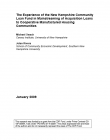
January 1, 2009
This study aimed to provide evidence of the extent to which a financial product―land acquisition loans for manufactured home parks―performed well and was adopted by mainstream financial institutions. The study hypothesized that The New Hampshire Community Loan Fund’s effective introduction of the new loan product, coupled with excellent loan performance, led banks to adopt the loan product.
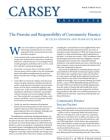
January 1, 2009
Community development finance has played an important role in community revitalization over the past 30 years and may be even more important in the current financial climate. But today community development finance institutions (CDFIs), as well as many community banks and credit unions face significant funding stress. This brief highlights the importance of refocusing support of CDFIs to sustain…
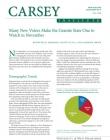
December 18, 2008
A third of potential voters in New Hampshire during the fall of 2008 have become eligible to vote in the state. Further, these potential new voters are more likely to identify with the Democratic Party and less likely to identify as Republicans than are established New Hampshire voters, contributing to the state's purple status.
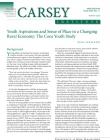
January 1, 2009
Youth in rural Coös County have surprisingly strong ties to their communities, finds a new report from the Carsey Institute. The brief is the first to report on a ten-year panel study of students who began seventh and eleventh grades in 2007 in Coös, New Hampshire's northernmost and most rural county.
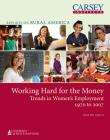
December 16, 2008
Seventy-three percent of married rural mothers with children under age 6 work for pay. As men's employment rates have dropped over the past four decades, more rural women are working to keep the lights on at home. Rural women are just as likely as their urban counterparts to work for pay, but they earn less, have fewer occupational choices, and have seen their family income decline as men…
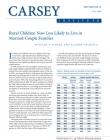
November 24, 2008
The percentage of rural children living in married-couple families dropped to 68 percent in 2008, one percentage point below that of children in metropolitan areas. In 1990, 76 percent of rural children and 72 percent of metropolitan-area children were living in married-couple families. But while marriage declined in both areas in the 1990s, urban rates bottomed out at 68 percent in 1998. The…
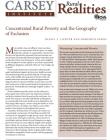
November 19, 2008
One-half of rural poor are segregated in high-poverty areas, a new policy brief co-published by the Carsey Institute at the University of New Hampshire and Rural Realities. This brief highlights the challenges faced by America's rural poor, particularly as they are physically and socially isolated from middle-class communities that might offer economic opportunities.
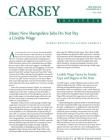
October 21, 2008
As the U.S. economy falters and recession looms, 79 percent of jobs in New Hampshire do not pay a wage sufficient for single-parent families with two children to provide basic needs such as housing, food, transportation, child care, and health care. Carroll County has the lowest percentage of livable wage jobs, with only 13 percent of jobs paying a livable wage for single-parent families with two…
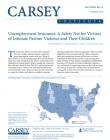
August 5, 2009
The Centers for Disease Control (CDC) estimates that over 5 million intimate partner assaults are perpetrated against women each year, and they lose more than 8 million days of work annually. Expanding Unemployment Insurance (UI) benefits to victims of domestic violence is one mechanism for supporting women as they seek to escape the violence in their lives.
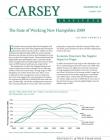
September 2, 2009
The issue brief finds that while New Hampshire workers have fared well compared with other New England states, wages have stagnated and full-time workers now form a smaller share of the labor force.
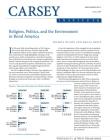
October 14, 2008
Reflecting the heterogeneous nature of rural America, rural Americans are divided primarily along religious lines on their perspectives of environmental conservation and climate change. And as rural voters and environmental issues become key issues in the upcoming presidential election, this religious divide presents a challenge to political candidates.
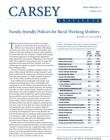
September 8, 2009
For working parents, family friendly work policies like paid sick days, flexible time, or medical insurance can reduce work-family conflict and lead to less absenteeism and higher productivity. Working parents in rural America, however, have less access to these policies than their urban counterparts.
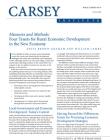
October 1, 2008
Rural communities working to find strategies for success in today's economy need to rethink the tools they are using. Brown-Graham is the executive director of the Institute for Emerging Issues and a policy fellow at the Carsey Institute. William Lambe is the associate director at the Community and Economic Development Program at the School of Government, University of North Carolina at…
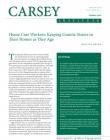
September 15, 2009
Using data from the New Hampshire Direct Care Workforce Survey, this brief shows that New Hampshire's demand for home-based care workers outpaces supply because its population is aging at a faster rate than the national average. These workers play a critical role and face many challenges, including low pay, little or no paid time off, and lack of access to health insurance.
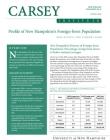
September 12, 2008
At the turn of the 20th century, New Hampshire had over 88,000 foreign-born persons, over 15,000 more than it has today. In 1900, the state's concentration of foreign born (21 percent) was higher than the national average percentage and more than three times the current percentage of 6 percent in the state. In 1900, New Hampshire ranked 15th of all states in percentage of the foreign-born…
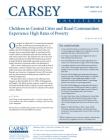
August 20, 2008
New U.S. Census Bureau data released in August highlight increasing similarities of poverty rates between children in urban and rural communities. This common indicator of child well-being is closely linked to undesirable outcomes in areas such as health, education, emotional welfare, and delinquency.
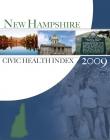
October 1, 2009
The Carsey Institute is participating in a national study to examine America's civic health. Led by the National Conference on Citizenship (NCoC), America's Civic Health Index is an annual study that measures a wide variety of civic indicators, such as community involvement and helping others. New Hampshire is one of six states partnering with NCoC to produce a state-specific report…
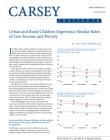
August 13, 2008
Data in this brief shows that the percentages of children living in low-income areas and poverty over the past fifteen years in rural and urban America are converging.
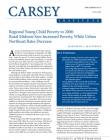
September 29, 2009
In 2008, America's recession affected poverty rates for children under age 6 unevenly, with rates in the rural Midwest rising significantly, while rates in northeastern central cities fell slightly. And in the rural South, where more than 30 percent of young children are poor, poverty rates for young children persisted at a very high rate. This is an analysis of American Community Survey…
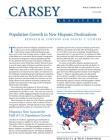
August 7, 2008
Natural increase—more births than deaths—is now the major engine of Hispanic population growth in many large metro areas and their suburbs, as well as numerous smaller metropolitan areas and rural communities. Hispanics now account for half of U.S. population growth, and Hispanic population growth is the reason many communities grew instead of declined.
